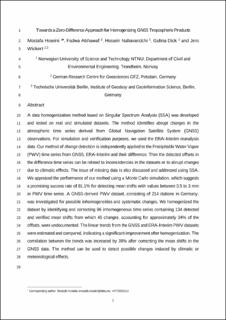Towards a zero-difference approach for homogenizing GNSS tropospheric products
Peer reviewed, Journal article
Accepted version

Åpne
Permanent lenke
https://hdl.handle.net/11250/2825229Utgivelsesdato
2020Metadata
Vis full innførselSamlinger
Sammendrag
A data homogenization method based on singular spectrum analysis (SSA) was developed and tested on real and simulated datasets. The method identifies abrupt changes in the atmospheric time series derived from Global Navigation Satellite System (GNSS) observations. For simulation and verification purposes, we used the ERA-Interim reanalysis data. Our method of change detection is independently applied to the precipitable water vapor (PWV) time series from GNSS, ERA-Interim and their difference. Then the detected offsets in the difference time series can be related to inconsistencies in the datasets or to abrupt changes due to climatic effects. The issue of missing data is also discussed and addressed using SSA. We appraised the performance of our method using a Monte Carlo simulation, which suggests a promising success rate of 81.1% for detecting mean shifts with values between 0.5 and 3 mm in PWV time series. A GNSS-derived PWV dataset, consisting of 214 stations in Germany, was investigated for possible inhomogeneities and systematic changes. We homogenized the dataset by identifying and correcting 96 inhomogeneous time series containing 134 detected and verified mean shifts from which 45 changes, accounting for approximately 34% of the offsets, were undocumented. The linear trends from the GNSS and ERA-Interim PWV datasets were estimated and compared, indicating a significant improvement after homogenization. The correlation between the trends was increased by 39% after correcting the mean shifts in the GNSS data. The method can be used to detect possible changes induced by climatic or meteorological effects.